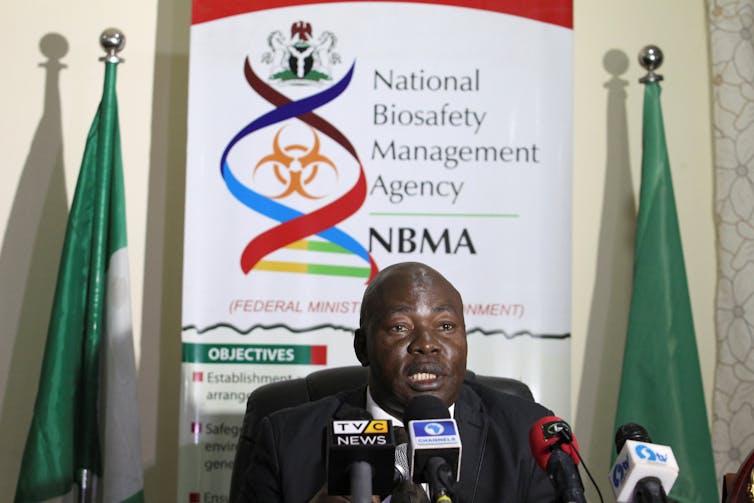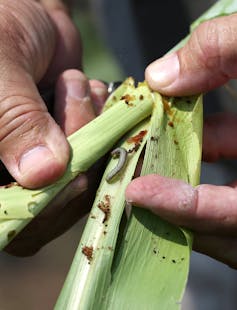I fight anti-GMO fears in Africa to combat hunger
- Written by Walter Suza, Adjunct Assistant Professor of Agronomy, Iowa State University
As a child, I remember feeling hungry most of the time. Growing up in rural Tanzania, I walked to school barefoot and most of the time had one meal a day. After school, I helped my mother with various farming chores, including feeding the animals, weeding, harvesting and planting. I often heard my mother express concerns about the lack of ways to protect our crops from drought, pests and diseases. I wanted to help my mother but was too young to understand what the solution might be.
In my undergraduate genetics class, I completed a term paper on the domestication of maize. I was surprised to discover that ancestral maize did not produce the type of kernels we consume today. It took humans thousands of years of deliberate selection to breed a maize plant capable of producing edible seeds. Subsequently, more work by plant breeders helped improve the genetics of maize for higher yield and tolerance to environmental stresses. This was fascinating to me, because when plant breeders interbreed plants, large sections of parental genetic material pass on to new varieties, but the function of many genes that end up in the crops we grow and consume remain unknown.
I am a plant physiologist at Iowa State University and director of the Plant Breeding Education in Africa Program[1]. I believe that Africa deserves cutting-edge technologies[2], including genetic engineering to develop stress-tolerant crop varieties and more nutritious staple crops to improve human health. However, the anti-GMO news and campaign[3] across the globe make me wonder whether improved crop varieties would ever reach small stakeholder farmers like my mother.
Humanitarian work in Africa
When I was working for UNICEF in Zimbabwe from 1999-2000, I met a young single mother with several children. Her village was in an area of the country that was facing a devastating drought and many families needed food. The purpose of my meeting with the woman was to assess her food security situation and whether she qualified for food aid.
Near the conclusion of my visit, I saw her little girl, probably 3 or 4 years old, sitting on the ground, eating porridge, probably the only meal she would have that day. The little girl did not appear too bothered by my presence, nor the flies that swarmed her plate. I was surprised she seemed happy. It was overwhelming for me to think that there were thousands of children in the area facing a similar situation. That day I dedicated my life to fight hunger and poverty.
 National Biosafety Management Agency Director-General Rufus Ebegba speaks during a press briefing, denying the importation or release of any GMO ‘poison’ rice into the Nigerian market in Abuja.
REUTERS/Afolabi Sotunde[4]
National Biosafety Management Agency Director-General Rufus Ebegba speaks during a press briefing, denying the importation or release of any GMO ‘poison’ rice into the Nigerian market in Abuja.
REUTERS/Afolabi Sotunde[4]
Graduate education and research
My doctoral training helped me understand the scientific process and biotechnology techniques for inserting new genes more precisely into plants. My research[5] on plant insect defense genes involved gene cloning and creation of genetically modified plants[6]. During my time in the laboratory, I often thought of my mother and the crop production challenges she faced. I felt that genetic engineering crops to increase resistance to insects could benefit small stakeholder farmers. I was hopeful that my research could benefit Africa.
Scientific research suggests that climate change will have a negative effect[7] on yields, especially in Africa. In addition, millions in Africa rely on starchy crops[8] as their staple foods and are more prone to mineral and protein deficiencies.
Scientists debunk GMO myths
In my opinion, scientists need to share more of the scientific facts about GMOs and debunk the myths. In many African countries, the root cause for resistance to GMO crops[9] is lack of public awareness of the scientific principles and benefits of biotechnology.
To help increase awareness, my team analyzed[10] dozens of research articles[11] on risk assessment of transgenic maize containing the Bt insect resistance gene. Bt maize is a transgenic crop that contains the Bt gene from the soil bacterium Bacillus thuringiensis. The Bt gene helps maize fight off insect pests such as the fall armyworm, Spodoptera frugiperda.
This work, recently published in Global Food Security[12], compared the risk assessment process for Bt maize with risk assessment in other fields such medicine and engineering. Risk can be defined as the likelihood of harm that happens from a set of specific conditions. Risk assessment uses fact-based information to define the effect of exposure to such harm on a given population. My team hopes that policymakers and leaders would read this article[13] to help them appreciate that risk assessment for GM crops is similar to the other kinds of risk assessments.
For instance, the maintenance of bridges uses risk assessment studies. Potential hazards with bridges include natural hazards, errors in design and traffic overload. These regular risks assessments determine the probability of bridge collapse to ensure public safety.
Risk assessments are also done to quantify the dangers of exposure to radon, a known carcinogen and significant health hazard recognized by many international environmental and health organizations[14]. Radon gas is naturally present in homes and risk assessment studies have enabled recommendations on safe levels of radon above which mitigation efforts might be required. Subsequently, in the United States, during sales of new homes, the seller is obliged to divulge their home’s radon value to the buyer.
For both the bridge and radon examples, the public is willing to trust the analysis by experts in these fields. But when the same kind of analysis is done for GM crops - like Bt maize - these expert risk assessments are considered less trustworthy than those for radon or bridges.
Educating future hunger fighters
Through the analysis of numerous research articles, my team agrees with experts in risk assessment that no significant impacts on human health or the environment[15] have been found with Bt maize. However, not using Bt maize to block the rapid spread of fall armyworm, which has destroyed maize and other crops across Africa[16], poses a risk to human health if other control measures such as pesticides are used in large quantities.
 A crop-eating armyworm is seen on a sorghum plant at a farm in South Africa.
REUTERS/Siphiwe Sibeko[17]
A crop-eating armyworm is seen on a sorghum plant at a farm in South Africa.
REUTERS/Siphiwe Sibeko[17]
Looking to the future, I believe there needs to be more investment in education and outreach concerning biotechnology and its applications in agriculture. Importantly, sustainable use of biotechnology in African agriculture depends on educating the youth. Educational programs such as Plant Breeding E-Learning in Africa[18] are an excellent platform to deliver educational biotechnology content to the next generation of African scientists.
My travels back to Africa from Ames, Iowa, bring back many memories. During daytime flights out of African cities, I look through the window to see the beautiful blue sea or vegetation, and hundreds of brown corrugated iron rooftops. The sheer density of tiny homes with rusty rooftops reminds me of the challenges ahead – the urgent need for agricultural revolution in the face of a population explosion in Africa[19].
With the little girl I met during work with UNICEF and my mother in mind, I listen to a whisper in my ears – “all people at all times have the right to sufficient and nutritious food for a happy, productive and active life.” This is an important reminder to continue spreading knowledge and awareness to improve food security in Africa.
References
- ^ Plant Breeding Education in Africa Program (pbea.agron.iastate.edu)
- ^ I believe that Africa deserves cutting-edge technologies (doi.org)
- ^ anti-GMO news and campaign (mg.co.za)
- ^ REUTERS/Afolabi Sotunde (pictures.reuters.com)
- ^ My research (doi.org)
- ^ cloning and creation of genetically modified plants (doi.org)
- ^ climate change will have a negative effect (doi.org)
- ^ millions in Africa rely on starchy crops (doi.org)
- ^ root cause for resistance to GMO crops (doi.org)
- ^ my team analyzed (doi.org)
- ^ dozens of research articles (doi.org)
- ^ published in Global Food Security (doi.org)
- ^ read this article (doi.org)
- ^ many international environmental and health organizations (www.who.int)
- ^ no significant impacts on human health or the environment (doi.org)
- ^ destroyed maize and other crops across Africa (www.fao.org)
- ^ REUTERS/Siphiwe Sibeko (pictures.reuters.com)
- ^ Plant Breeding E-Learning in Africa (pbea.agron.iastate.edu)
- ^ population explosion in Africa (www.un.org)
Authors: Walter Suza, Adjunct Assistant Professor of Agronomy, Iowa State University
Read more http://theconversation.com/i-fight-anti-gmo-fears-in-africa-to-combat-hunger-109632

